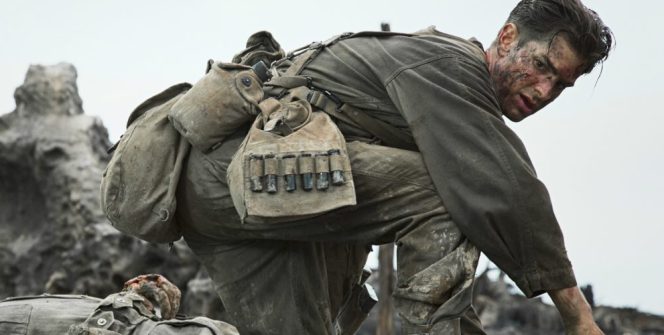A great story doesn’t always translate into a great movie, and that’s the disappointing case with Hacksaw Ridge. No one could invent a more impressive or inspiring tale than the true story of Desmond Doss, a backwoods Virginia boy and Seventh Day Adventist who took the commandment “Thou Shalt Not Kill” to heart. He refused to even handle a rifle, yet his patriotism impelled him to enlist in the Army during World War Two with the hope of becoming a medic. His goal was to save lives rather than take them.
Andrew Garfield fully captures the wide-eyed sincerity of Doss in his performance, no easy task in these days of cynicism and irony. Teresa Palmer is equally good as the small-town nurse he falls in love with.
But in the screenplay, credited to Robert Shenkkan (the playwright noted for The Kentucky Cycle and co-writer of The Pacific miniseries) and prolific Australian writer-producer Andrew Knight, Doss’ experiences during basic training seem shopworn and obvious. At least they are enlivened by Vince Vaughn’s potent performance as a drill sergeant.
It is only when we reach the battlefield and see Doss in action, summoning physical and spiritual strength to save dozens of lives without a thought of his own safety, that the film validates its purpose.
Yet here, too, there is a problem: director Mel Gibson thrives on violence. The film opens on horrifying and graphic scenes of war at its worst, in the chaos of battle with soldiers’ bodies on fire, being blown apart. No one would suggest that Gibson soft-pedal the reality of war in the post-Saving Private Ryan era, but these grisly, unrelenting images (with far too many shots of rats gnawing at rotting corpses) threaten to overwhelm the film’s real purpose: dramatizing one modest man’s moral convictions.
I won’t dwell on other, smaller problems like Sam Worthington’s nonexistent American accent. Those issues in this Aussie-made movie are balanced by the fine performances given by Rachel Griffiths and especially Hugo Weaving as Doss’ parents.
Hacksaw Ridge is a case of good intentions gone astray. I recently caught an old movie on TCM that succeeds in every way that this movie fails: Gary Cooper plays the leading role in Howard Hawks’ Sergeant York (1941), the story of a real-life rural boy not unlike Desmond Doss, but set in World War One. It may be sentimental, even corny at times, but it still works. Andrew Garfield manages to capture some of that Cooper sincerity; it’s too bad his collaborators behind the camera couldn’t follow his lead.








